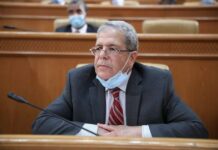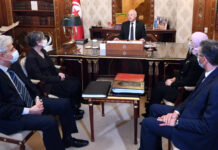The case of Rached Khiari gained its weight and impact because of the brazenness and defiance that a representative can exercise against the state, its symbols, institutions, army and law. His case aroused a great deal of controversy, which gave it a different dimension from what bloggers’ cases usually acquire.
The problem started with an amateur video, through which Rached Khiari wanted to prove that he knows many facts and that he is so clever that he does not miss anything. He talked about contacts with the American ambassador in Paris, intelligence recruitment, and other conversations that no sane person would believe. The video also included some pictures of Kais Saied with Fawzi Daas during his presidential campaign and some Western Union money transfers.
Complicating the Situation and Belittling the State
The Presidency of the Republic could have refuted what Khiari presented to the media through a statement, communication, or clarification from any official in the presidency, denying these charges against the president, and asking the Speaker of the House of Representatives to remove the immunity of the aforementioned deputy to be tried on charges of insulting the head of state, fabricating lies and causing sedition.
But what happened was that the Presidency of the Republic immediately authorized the Military Prosecution to track him, so the latter issued a telegram that was not implemented. Rather, the Prime Minister declared that it would not be implemented when he was asked about the Ministry’s inability to know the whereabouts of a parliamentarian. He said literally, “No, the Ministry is not incapable, but the arrest of an immune deputy will greatly harm Tunisia’s image abroad,” meaning that keeping him on the run was deliberate by the government and the Ministry of the Interior.
The reaction of the Assembly of the Representatives of the People raises questions, as it did not bother dealing with the military summons card, nor did it discuss the issue of removing the immunity of MP Khiari, and even more, it granted him the right to participate remotely in the discussion and vote on some bills, and he also receives his parliamentary salary with grants as if he were an attending deputy. This further complicated the situation, made the state even more contemptuous, and increased the humiliation of official bodies, and contempt for institutions.
Further State challenge
This situation encouraged Rached Khiari to further challenge the state, so he reappeared and returned to Parliament to support his comrades in winning the decisions of the Speaker and in passing laws that are intended to be passed these days before the parliamentary recess, which many blocs oppose, and in which the ruling majority needs every voice to support.
Even worse, he repeated the same scenario. This time he spoke from inside his car somewhere in the capital—it was said that he was in the same region of Carthage—in clear defiance of the President of the Republic, and recounted the same accusations, the same insults and the same topics he raised in the first video.
He challenged Kais Saied to be able to carry out a subpoena against him, and to be able to stop him or try him, and asked him again to strip the presidential immunity and face him in a civil court.
This is how the state’s official institutions have become, and this is how charges against the head of state are dealt with by a people’s deputy, such as communicating with foreign bodies, receiving money from embassies of other countries and working for international intelligence.
What is rumored is that the military court has issued a new summons card against Rached Khiari although it knows well that it will not be implemented by the official authorities, and that it itself will not be able to implement it, which therefore increases its embarrassment and humiliation.
Not a Coincidence
What happened with MP Rached Khiari is not a coincidence, nor is it an isolated or abnormal process that is preserved and not measured, but has become the case for years, because the weakening of the state, the belittling of its institutions, and the trampling of its law is not only related to Rached Khiari. Rather, it is a policy of displaying strength and muscle for years, by people belonging to all parties without exception, and we saw this previously in the airport, in the port, in Parliament, in the Casbah, and even in some ministries whose ministers deliberately not pass the trust to those who were appointed as their successors, and we saw it recently in front of the headquarters of a national security office in Gafsa al-Madina when the agents refused to work under the command of a new office chief, and gather in front of the office with their weapons, openly supported by their union, while the concerned authorities did not move a finger.











